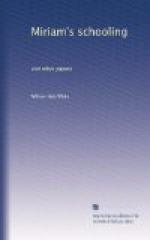the smoke of the burnt-offering rose in the clear
air, the Philistines came up the hill to battle with
us, and the people cried, and were on the point of
fleeing this way and that way, to be pursued and slain.
I commanded them to be still. The Philistines
drew nearer and nearer, and I prayed ever more and
more earnestly. The smoke of the offering was
beginning to die down, and yet I prayed. The
fire was well nigh out to the last spark, and for
a moment I doubted, forgetful of the vision, for the
music of the army of Dagon could now be heard.
Suddenly the fire flamed up on high from the grey
ashes, as if a heap of the driest wood of summer had
been thrown on it, and I saw a little cloud gather
on the other side of the Philistine hosts, and I knew
that my prayer was answered. The flame dropped
instantly, but the cloud spread itself even as I looked,
and the wind arose, and hither and thither across the
cloud flashed the lightning. Onward it came till
it rested over the Philistines, and then it broke
and descended on them, and they were shut out from
us in thick darkness. The thunder of the Lord
crashed and rolled, and we saw His lightnings pierce
down like swords. Silent we stood, and presently
the cloud lifted, and the Philistines, who, a few
minutes before, marched against us in order, were a
confused mass, struggling hither and thither, and
many of them were lying dead on the ground.
Then, with one accord, Israel shouted, and ran and
smote the Philistines until they came under Bethcar.
I went not with them; but when they had all departed,
I took a stone and set it up between Mizpeh and Shen,
and wrote on it Ebenezer, for hitherto had the Lord
helped us—the Lord, I say, and never a
man, as it was the Lord and never a man who has helped
us since we left Egypt.
After that defeat the Philistines troubled us no more,
and the cities which they had taken from us were restored;
but when I became old, the people grew restless, and
desired a change. The Lord, to humble me, and
prevent boasting by His servant, had afflicted me with
two sons, who obeyed not His commandments; and the
people put forward these two sons, who were judges
under me, as a reason why a king should be given them.
If, however, my sons did injustice, I was still alive
to whom appeal could be made, and why should a king,
because he was a king, be better? The Lord had
brought us out of Egypt, and had ruled us through
His ministers. We had no court, with women and
with splendour; and those who won our battles lived
like those whom they led. Our gold and our silver
were saved for the House of the Lord, which was His,
and for all of us. The office of king was foreign
to us: it was heathen and hateful to me.
None more earnestly than I worshipped the Lord, and
submitted myself to His direction, and imposed His
will even to death upon the people. But that
a man, because he was called king, should rule, and
send the people hither and thither for his own ends,
and slaughter them, was horrible to me. I sought
the Lord in prayer to know how I should meet this
request, and He counselled me to yield.




